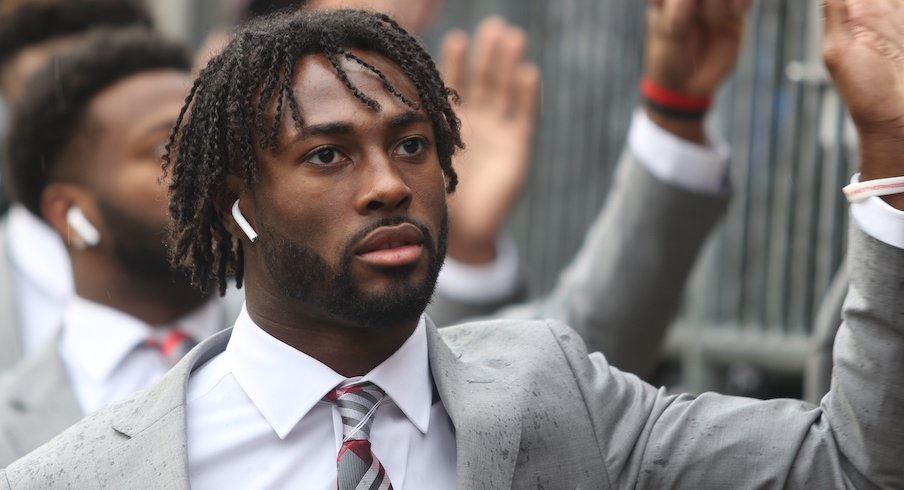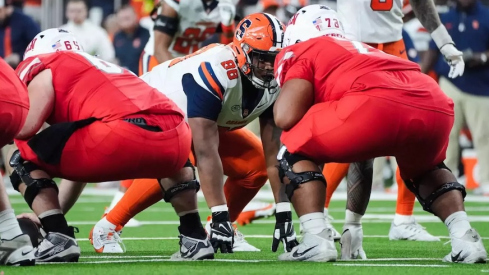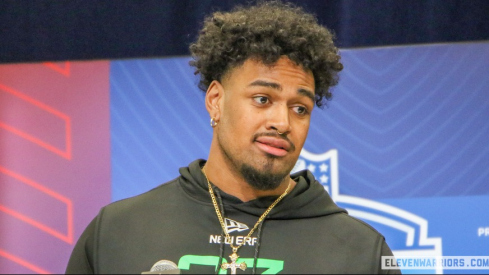When Jordan Fuller was called for a targeting penalty in the fourth quarter of Ohio State's 56-27 win over Michigan on Saturday, he immediately thought back to Ohio State's 2018 win over Nebraska.
Fuller was also called for targeting in that game, and that time the penalty stood. A Nebraska player was going down to the ground attempting to make a catch as Fuller came in for a tackle, which resulted in Fuller's shoulder colliding with the receiver's head and neck, and he was ejected even though his hit did not appear to come with any malicious intent.
Ohio States Jordan Fuller was ejected for targeting. pic.twitter.com/cccZ7MKgzd
— Dustin Schutte (@SchutteCFB) November 3, 2018
A similar scenario played out on Saturday.
As Michigan receiver Donovan Peoples-Jones caught a pass coming over the middle of the field, Fuller came in for a tackle and Peoples-Jones dropped his head into Fuller's shoulder, resulting in a targeting call. This time, though, the call was overturned following a replay review by the officials.
Fuller admitted during his appearance on the Big Ten Championship Game players' teleconference on Monday that he was pleasantly surprised that the penalty was overturned, even though his hit came with no malicious intent once again.
“I had been ejected before, so I was kind of leaning toward like ‘Dang, I’m gonna be ejected and I’m gonna miss the next week’s game.’ But thankfully, they reviewed it and they came to the conclusion that I wasn’t targeting,” Fuller said. “So I’m very thankful for that, but I definitely thought I was going to be thrown out, just after last year, me being thrown out of the game.”
”It was kind of one of those things like last year against Nebraska, I felt like there was nothing I could have done differently, and I felt the same way this past Saturday, so it was really just in the ref’s hands, and I’m just happy that they went the opposite way,” Fuller added.
Had Saturday's targeting penalty stood, he would have also been suspended for the first half of this week's Big Ten Championship Game against Wisconsin because his ejection would have occurred in the second half.
Fuller might have been saved, though, by new NCAA guidelines implemented this season that directs officials to not only review all targeting penalties, but overturn them if they cannot confirm all elements of targeting. Big Ten coordinator of football officials Bill Carollo said at this year's Big Ten Media Days that he expected targeting penalties to decrease by about 10 percent as a result.
”Last year, if we weren't sure, the play would stand, and that player would be disqualified. This year, all elements have to be confirmed,” Carollo said at the time. “We want to get this play correct. It's a very important play as far as health and safety, but it's also the penalty that is our largest penalty, so we want to make sure that we get that correct, and if we aren't sure, the player will stay in the game.”
As a result, Fuller will be available to play against Wisconsin on Saturday – an important outcome for Ohio State's defense, as backup safety Josh Proctor has been unavailable for the past two games due to an undisclosed injury while cornerbacks Shaun Wade and Damon Arnette are also dealing with injuries.
Fuller's non-targeting likely would have been more quickly forgotten if not for a couple tweets over the weekend that called the character of Fuller – an Academic All-American, a finalist for the Campbell Trophy and a semifinalist for the Lott IMPACT Trophy – into question as a result of the hit. Fuller made it clear on Monday, though, that he was simply trying to make a football play and was not trying to deliver an intentionally violent hit.
“I’m just out there playing football as fast and as hard as I can, and never playing in a malicious way and never trying to hurt anybody, but still at the same time, trying to make plays for my team,” Fuller said. “So yeah, I’m glad they got it right this time.”


